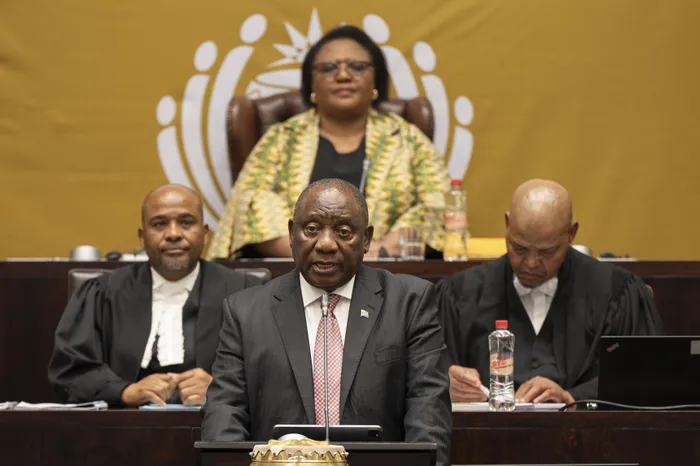
President Cyril Ramaphosa before the National Assembly in Parliament, Cape Town
Image: Armand Hough / Independent Newspapers
President Cyril Ramaphosa has defended his decision to establish a commission of inquiry to look into the recent explosive allegations made by KwaZulu-Natal Police Commissioner, Lieutenant General Nhlanhla Mkhwanazi.
Tabling the budget of the Presidency in the National Assembly on Wednesday, Ramaphosa said Mkhwanazi alleged that Police Minister Senzo Mchunu had interfered with sensitive police investigations and colluded with business people, including a murder accused, to disband the Political Killings Task Team based in KwaZulu-Natal.
“These allegations are serious. They are also untested,” he said.
“It is, therefore, necessary that we establish the facts through an independent, credible, and thorough process so that we can ensure accountability and safeguard public confidence in the police service,” the president said.
Ramaphosa announced the commission of inquiry to be led by Judge Mbuyiseli Madlanga and has since placed Mchunu on special leave and appointed Wits professor Firoz Cachalia as acting police minister from August.
There has been criticism following his decision to appoint the commission, with some claiming their recommendations were not implemented and were used to shield certain individuals.
Ramaphosa said it was strange that some people have voiced strong opposition to the establishment of the commission of inquiry into Mkhwanazi’s allegations.
“Some have said that I should take immediate punitive steps against the minister on the basis of untested allegations. Not only would this be unfair, but it would create a dangerous precedent. The commission should be allowed to do its work.”
He also lashed out at what those he said resurrected “the tired line” that the commissions and panels have not produced any meaningful results.
“This view is wrong. It is not borne out by evidence.”
Ramaphosa said the integrity and credibility of the criminal justice system was vital to their ongoing efforts to combat crime and corruption.
“We must, therefore, be concerned when reports emerge and allegations are made that threaten to undermine the stability and effectiveness of these institutions.”
He also said he recently established two commissions of inquiry to interrogate aspects of the criminal justice system.
One of the recent commissions, to be chaired by former justice Sisi Khampepe, will investigate allegations of undue interference in the investigation and prosecution of apartheid-era crimes.
“Not only is the commission necessary to ensure justice for the victims of apartheid-era crimes and their families, but it will provide valuable lessons as we strengthen our efforts to ensure accountability now and into the future.”
Ramaphosa stated that the commission on the South African Revenue Service (SARS), which was chaired by Judge Robert Nugent, resulted in a comprehensive overhaul of SARS’ leadership, governance structures, and operational capacity.
“This has enabled SARS to significantly increase revenue collection, improve compliance, and recover substantial sums of unpaid tax.”
The Commission of Inquiry into the Public Investment Corporation, chaired by Judge Lex Mpati, had exposed serious governance failures and led to far reaching institutional reforms.
“These commissions resulted in disciplinary actions and the cancellation of unlawful contracts.”
Ramaphosa further said the implementation of the recommendations of the High-Level Panel on the State Security Agency (SSA) contributed significantly to SSA’s stabilisation and recovery, improved oversight and accountability, and the structural reforms contained in the General Intelligence Laws Amendment Act.
He added that the government has taken steps to ensure better intelligence coordination, capacitating public order policing, strengthening community policing forums, and streamlining the functioning of the National Security Council after the recommendations of the expert panel on the 2021 civil unrest.
The government has undertaken major reforms based on the State Capture Commission, popularly known as the Zondo Commission, which was presented to the president in the three years since the final report.
“Eight new laws have been enacted to strengthen our anti-corruption institutions, enhance the procurement system, reform the intelligence services, and improve corporate accountability and public administration.”
He said the value of assets linked to State Capture that have been recovered by the state stood at nearly R11 billion by March 2025, and another R10.6 billion is currently frozen, awaiting the outcome of cases in court.
Ramaphosa said each of the commissions and panels unearthed information and made findings that were critical to understanding the events that took place.
“They were essential in ensuring accountability and providing recommendations on strengthening our institutions and processes."
Cape Times
Related Topics: